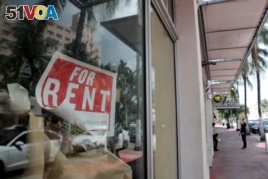30 July 2020
The United States economy shrank at a yearly rate of 32.9 percent between April and June of this year. It is the worst quarterly contraction in the economy ever recorded.
The contraction came as the coronavirus pandemic pushed struggling businesses to close for a second time in many parts of the country. The closures have left millions of Americans out of work.
The U.S. Commerce Department released the economic numbers Thursday. Its estimate of the contraction in the Gross Domestic Product (GDP) is the worst since the government began keeping such records in 1947.
The decrease comes after a 5 percent drop in economic activity during the first three months of the year. That is when the economy officially entered a recession, ending 11 years of growth, the longest on record in the country.
The record-setting contraction resulted from a collapse in consumer spending, which makes up about 70 percent of economic activity. Restaurants, stores, and theaters closed, while Americans stopped traveling. People did not spend as much money because there was nowhere to spend it.
The drop in GDP shows the "unprecedented hit to the economy from the pandemic,"said economist Andrew Hunter. He added that "it will take years" for the economy to recover. Hunter works for Capital Economics, an economic research service based in London.
So great was the contraction that many experts expect economic activity to rise sharply during the current quarter. Some predict the economy will grow as much as 17 percent, or higher, between now and the end of September.
Yet with the rate of confirmed coronavirus cases rising in many states, more businesses are being forced to either cancel their reopening, or close down again. In addition, the U.S. Senate is considering a proposal to cut government aid to the unemployed. So, it is possible the economy could get even worse in the months to come.

FILE - In this July 13, 2020 file photo, a For Rent sign hangs on a closed shop during the coronavirus pandemic in Miami Beach, Fla.
In addition to consumer spending, business investment dropped 27 percent and housing fell 38.7 percent between April and June.
State and local governments have been hurt by the loss of tax money and job losses. State and local government spending decreased by a yearly rate of 5.6 percent.
But total government spending was up 2.7 percent because of federal efforts to ease the pain of the recession. Federal spending has risen 17.4 percent, mostly for more than $2 trillion in a coronavirus aid plan. Congress sent many Americans $1,200, gave loans to many businesses and increased unemployment aid.
Congressional leaders and the Trump administration are talking about more aid for people and businesses to fight the recession.
In a separate report Thursday, the Labor Department said requests for unemployment aid increased 12,000 to 1.434 million in the week ending July 25. Nearly 30.2 million jobless Americans are receiving unemployment aid.
President Trump has urged states to reopen businesses. But there are worries that the virus remains a threat to workers and consumers at service industry jobs that often require face-to-face contact.
Many economists say the economy cannot fully recover until the coronavirus is defeated. Federal Reserve Chairman Jerome Powell said on Wednesday that the virus has been endangering a small economic recovery. For that reason, he said, the U.S. central bank plans to keep interest rates near zero well into the future.
I'm Susan Shand.
The Associated Press reported this story. Susan Shand adapted it for Learning English. George Grow was the editor.
________________________________________________________________
Words in This Story
contraction - n. the state of getting smaller
pandemic - n. a contagious disease that moves from one country to another
gross domestic product - n. the entire output of goods and services in a nation
unprecedented - adj. something that has never happened before
consumer - n. a person who buys things